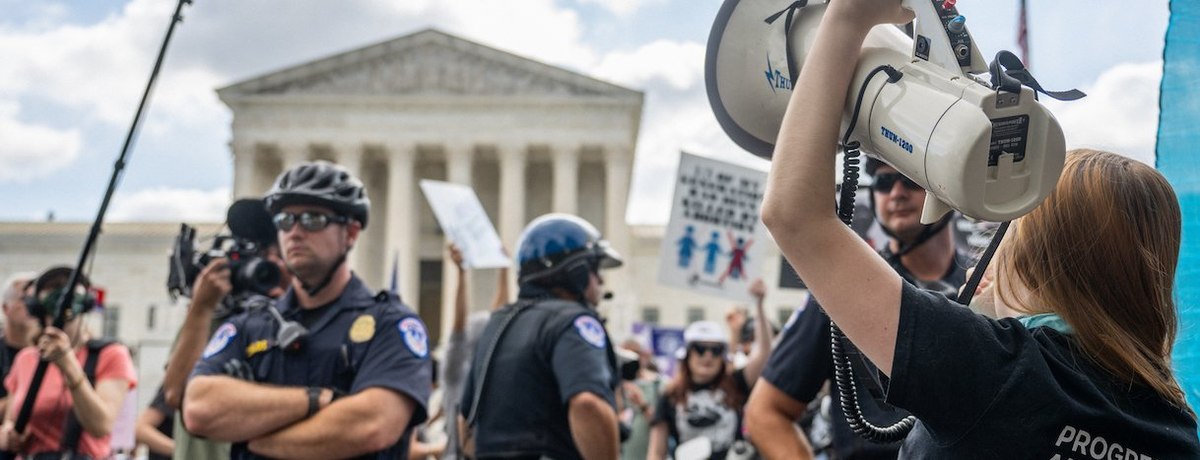Half of Americans disapprove of the Supreme Court’s recent ruling overturning Roe v. Wade, and many want Congress to take action codifying abortion rights into law. Half of Americans also support increasing protections around digital health data that could be used to prosecute people who have abortions. Results from our latest Economist/YouGov poll, conducted shortly after the ruling, also suggest that the Court’s decision could have implications for the outcome of this year’s Congressional elections.
Last Friday, the Supreme Court issued a decision in the case of Dobbs v. Jackson Women’s Health Organization that overturned Roe v. Wade and eliminated the constitutional right to abortion in the United States. An Economist/YouGov Poll fielded in the four days following the ruling finds that nine in 10 Americans have heard something about the decision. While Americans are divided on the outcome of the case, more disapprove (50%) than approve (42%). Three-quarters of Republicans (76%) approve, compared with 20% of Democrats. There also is a sizable gender gap: Men narrowly approve by 50% to 43%, while women oppose the ruling by 56% to 34%.
While majorities of both Republican men and Republican women approve of the decision, there are gender differences among Democrats (though majorities of both Democratic men and women oppose the ruling) and especially among Independents. More than half (53%) of Independent men approve of the ruling, while only 59% of Independent women do not approve.
Despite opposition to the ruling, more Americans say abortion decisions should be left to the states (45%) than think it should be decided nationally (40%). Nearly two-thirds of Democrats say it should be decided nationally (64%), while only 22% of Republicans agree; 69% say it should be left to the states.
What steps, if any, do Americans want Congress to take in response to the ruling? By 53% to 37%, Americans say Congress should pass a law establishing a national right to abortion (women support this by a margin of greater than two to one). A slightly larger share – 57% – support a law that would legalize abortion within the first trimester. Even more – roughly three-quarters of Americans – support legalizing abortion in the case of rape or incest, as well as in cases where the woman’s health is endangered by the pregnancy. Meanwhile, only 25% support the passage of a nationwide ban on abortions, while 67% oppose such a ban.
As for possible presidential actions, by 46% to 33% Americans support having the Food and Drug Administration (FDA) drop any remaining restrictions on abortion pills, which account for more than half of U.S. abortions. An even larger share of Americans approve of pressuring states to cover Planned Parenthood with their Medicaid programs and increasing protections around digital health data that could be used to prosecute people who have abortions (50% and 51%, respectively). But Americans are evenly divided (43% support, 44% oppose) on providing financial support to people crossing state lines to have abortions.
Americans appear to reject Clarence Thomas's suggestion of overturning other precedents that he made in his concurring opinion in the Dobbs case. By 53% to 31%, U.S. adults oppose the overturning of Obergefell v. Hodges, the 2015 decision that legalized same-sex marriage, and by 61% to 21% Americans oppose overturning Lawrence v. Texas, which legalized same-sex sexual activity legal in 2003. Just 10% support overturning Griswold v. Connecticut, which legalized contraceptives for married people in 1965. Democrats and Independents are generally aligned when it comes to gay rights, with Republicans being the primary outlier. Only 28% of Republicans support Obergefell and 42% support Lawrence. Support for keeping birth control legal is high among Americans from both major parties, as well as Independents.
Other findings relating to abortion and the Supreme Court from our latest Economist/YouGov poll:
- One big question is how much the Court’s ruling will matter in November: 47% of Americans, including 52% of women and 59% of Democrats, claim their vote will be determined by a candidate’s position on abortion. Half call it a “very important issue in determining their vote,” with nearly twice as many Democrats (67%) as Republicans (35%) saying this.
- Republicans still have an advantage in their enthusiasm for voting in the midterms, though Democrats narrowed the gap over the past week. Last week, Republicans were 14 points more likely than Democrats to say they were “more enthusiastic” about voting this year than they usually were. This week the gap narrowed to 6 points, with 46% of Republicans saying they’re more enthusiastic than usual, compared with 40% of Democrats.
- In addition to the standard questions we ask on abortion, this week we also gauged opinions on the legality of abortion under a variety of new circumstances, not asked about in prior surveys. Below is the share of Americans who say abortion should be legal when…
- 58% - The woman has a severe physical disability
- 57% - The woman has a severe mental illness
- 47% - The woman is in an abusive relationship
- 45% - The woman is currently in prison
- 43% - Having a baby will cause the woman mental or emotional distress
- 19% - The woman would prefer a baby with a different gender
— Carl Bialik, Linley Sanders, and Oana Dumitru contributed to this article
This poll was conducted on June 25 - 28, 2022 among 1,500 U.S. adult citizens. Explore more on the methodology and data for this Economist/YouGov poll, and a round-up of YouGov's recent polling on abortion.
Image: Getty












